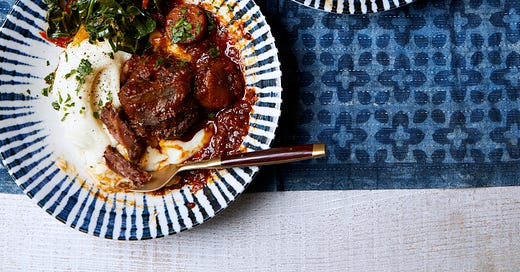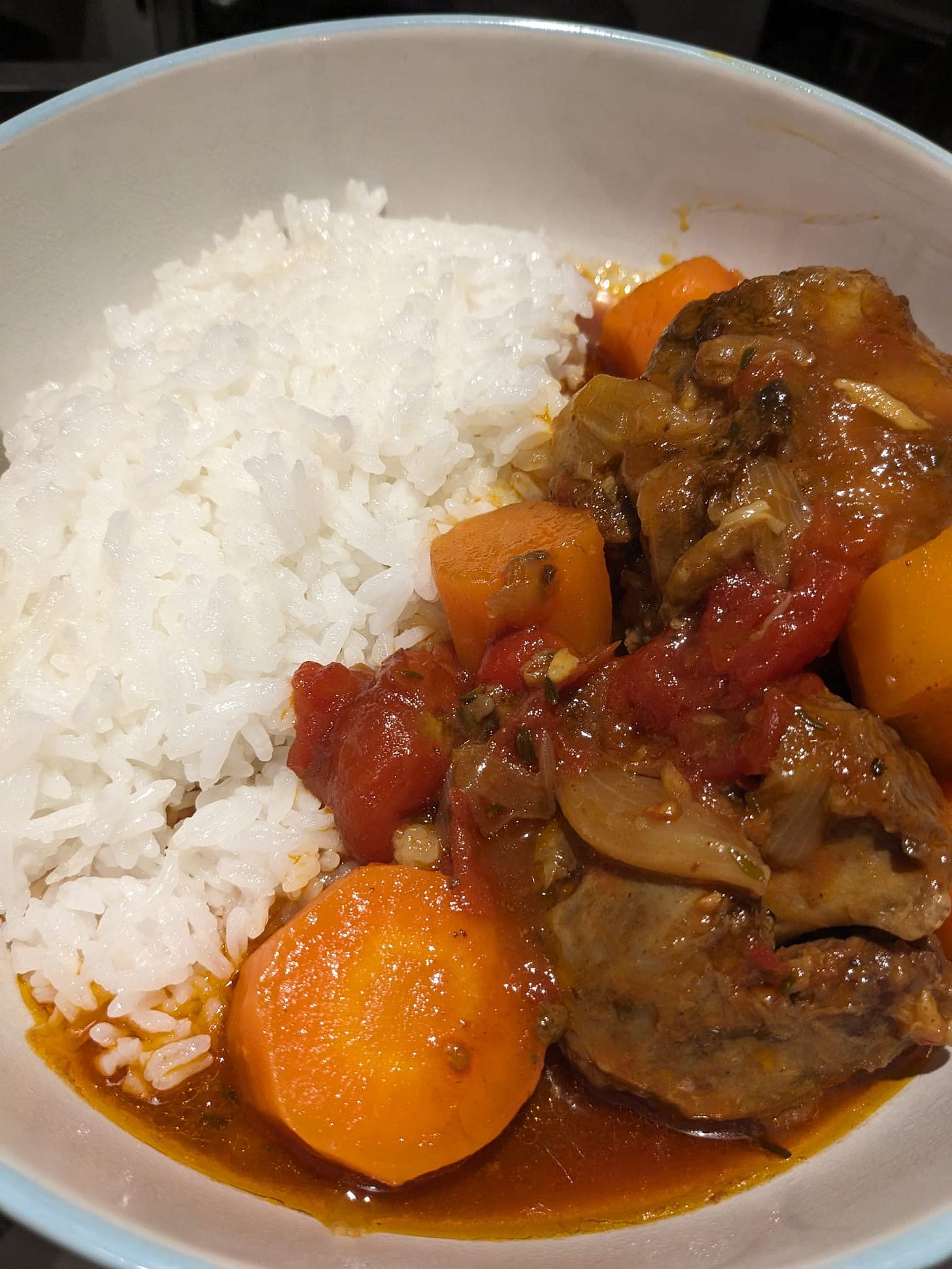Mothered Oxtail ~ The love & legacy of mothers
Listen to my latest episode of BBC The Kitchen Cabinet
Welcome to COOK WITH LERATO! Letters for you with ravishing recipes, stories & a good dose of African magic. If you haven’t joined our community, what are you waiting for? Click below to subscribe for free or upgrade to support the growing village that makes this sunshine possible.
Listen to little snippet from the show
Hello Sunshine!
How does a story shared between 2 friends inspire a much loved recipe in a cookbook, a recipe that is highly praised by Nigella, and one that becomes a topic for discussion on a radio show listened to by over 2 million people?
With a mix of purpose, fortuitousness & blessings, Mothered Oxtail was brought to life after a conversation I had with my friend Nicola in 2020, during the height of the pandemic. We had met a year before at a women’s social event in Brighton, and she later attended one of my supper clubs. While writing my cookbook, I wanted to include stories from other African women like me, especially those of us raised for a considerable amount of time on the continent.
I asked her, “What is that one dish that reminds you of your childhood with your mother?” And she described this heart-warming dish from her childhood in Malawi. Slow-cooked with meat, vegetables, wine - what South Africans will know as Potjiekos (pronounced “poy-kee-kos”) but with extra chillies. A dish that we will have to piece together with no recipes at all. With guidance from the loving memories of Nicola and her mother who has since passed away, and guidance from her aunties, we have been able to share this story and recipe far and wide.
This is the power of storytelling, and with great context of one’s lived experiences, the power of writing books and the power of representation in the media. In many cultures across the world, Mothers & Aunties hold our treasured recipes in their heads and in their hearts. More often than not, they rule the homes, the kitchens, keeping the family happy, alive and well with sumptuous food every day. Whilst many still keep their jobs as business owners, teachers, traders, doctors and more. In African cooking, the legacy of Mothers is so strong and influential, but not documented and celebrated as much as it can be. To share their stories and recipes is to honour them, but also to preserve our own legacy in this world. When we share our stories, we educate, we inspire and remind people that we exist, and we matter a great deal.
As a child, I learned to cook by watching the women, our mothers and aunties. We love to feed others, using the skills we have acquired, however when it comes to sharing the recipes, we are also faced with the same block our mothers are or were faced with. We don’t have measurements, and so we teach by 'show and tell' and through stories. How do we know how much salt or spice to add to a dish? We just know! As incredibly as that may sound to many, it is the truth.
If we are so generous and knowledgeable, and with such diverse flavours and stories passed on through our mama’s, why are very little of our recipes and stories shared with the world?
Could it be as a result of systemic racism, that our stories are suppressed from the global landscape, from so-called mainstream television, radio and magazines? Yes, I am in a top food magazine this month, for which I am ecstatic, but how many more of us are in magazines on a regular basis? Could it be because of a lack of knowledge or resources to find out more? Resources like cookbooks, TV shows, history books etc Could it be that we as a continent have not done a lot to celebrate and document our own foods? I wonder what all the possible reasons could be. I don’t have an answer for what the cause could be. However, I do have a solution that I believe is working, by sharing those stories and recipes with you in any way that I can.
That is why Alicia, a 20-year-old student at Warwick University in the UK, can cook this same dish and share the photo with her parents, who shared it with me. She was given Africana as a gift at Christmas and is actively travelling through the book, while at university.
For now, I hope you enjoy listening to my latest episode of The Kitchen Cabinet, (a popular show in the UK, so popular that a taxi driver once asked me, did I hear you on the radio the other day? My name and signature laughter gave it away!) I am a regular panellist on the BBC show and on this episode, rather serendipitously, my friend Nicola was a guest, and my answer to Jay's question about my use of wine in cooking, brought our chat amongst two friends from an audience of 2 to an audience of over 2 million, with an important story celebrating the legacy of her mum, of African Mothers, and Aunties.
See the recipe for Mothered Oxtail here and Listen here
Lewes ~ Series 43, The Kitchen Cabinet
Jay Rayner and his panel of food connoisseurs are in Lewes for this week’s episode. Joining Jay are chef Tim Anderson, food writer Lerato Umah-Shaylor, and drinks expert Alice Lascelles.
The panel discusses the best way to use up a glut of avocados, how to use nettles in cooking, and the best type of crisps to pair with wine.
Meanwhile, drinks journalist Alice Lascelles takes us through the best types of English wine, while Tim Anderson offers up his tips and tricks for cooking with Japanese fruit, yuzu. The panel also addresses the question on everyone’s mind - if you could bathe in one fruit, what would it be?
Listen to my previous episodes here
*My Award-winning cookbook, Africana*
Africana is available worldwide from the links below, including signed copies. If you love and enjoy the recipes please leave a review here. It goes a long way.
👩🏽🍳 Read about: Cook With Lerato & catch up on previous posts here
❤️ Are we friends on socials? Say hello and tag me when you cook my recipes Instagram | Facebook | Twitter | Pinterest
🌺*Join the Waiting List for Our Cooking Holidays & Retreats across Africa*
Thank you for reading today. Share this sunshine with your family and friends, and also receive treats as a little thank you from me.









